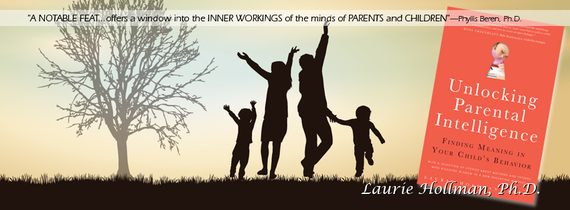
You're in the next room with the door closed discussing an impending divorce. Your children are playing in a nearby room with lots of chatter and bustling about. Later you're surprised, no, shocked when your three-year-old pipes up sobbing: "When are you getting a divorce? Who will take care of me?"
You're on a road trip and the kids are asleep in the back seat. You're discussing the violence that took place in Paris and wondering whether you should be afraid in New York where you live. You've seen that frightening ad on television that reminds you to make a plan to know where each family member is in an emergency. You start to make a plan. Hours later, your 12-year-old son says with fear in his voice, "How will I find you if I'm on a field trip at school?" At first you don't know what he's talking about and then you recall your conversation when you thought he was sleeping.
You greet each other in the kitchen and hug and whisper to each other, "I missed you today. I love you." The kids are doing homework at the kitchen table, snacking, and listening to music. Your teenager drops his backpack rather loudly and says, "Hey you guys. Cut it out. It's embarrassing." However, he's happily overheard his parents love each other and has a grin on his face.
For better or worse kids overhear what we say. They register our tones of voice, our gestures, our facial expressions, and our feelings. They may never let us know as the kids above did. Instead they may tell others that Obama isn't an American citizen, abortion is killing, the climate changes are going to make the world uninhabitable when they are old, immigrants are scary. Whether you believe any or some of that from your perspective, children may think they are living in a whirlwind of fear and dread from what they overhear from us and from the news we allow them to hear.
With security guards at their schools, bomb threats, fire drills, frightened teachers, they may be reacting like they are in a war zone. Maybe you think they are. Maybe you think they are actually safe in their environments.
What do you want them to think and know? We need to make conscious decisions about these issues.
Six Tips on What Kids Hear
1. If you are going to discuss the violence and terrorist threats in the news be aware your children hear you. Consider their stages of development and ages and the impact of what you are saying on their minds and feelings about safety.
2. Take time to discuss how issues of violence are complex and how common and how rare actual specific dangers are for your individual child.
3. Generally speaking, children prior to adolescence do not have well-developed abstract thinking and may think in black and white terms which means they don't understand the subtleties and nuances of political ideas. If they hear something scary, they may very well conclude it's totally true or false--no gray areas. Thus, their conclusions may be very inflexible and therefore frightening.
4. If you don't want your children to know about changes in your life before you've made clear judgments about how to specifically tell each of them what may come to affect their futures (divorce, change of residence, change of employment, change of schools, monetary losses or gains), discuss your plans outside of the house.
5. Each child is different not only in age and developmental stage, but in sensitivity, temperament, naivety, sophistication, readiness to be easily influenced without reflection, and being capable of having their own thoughts separate from yours.
Encourage your children to question what they hear not only from you and the news, but from their friends, their friends' parents, and their teachers.
Blind acceptance hinders learning., creates dogmatism and fear. Questioning opens up learning and offers hope.
Laurie Hollman, Ph.D. is a psychoanalyst with a new book, Unlocking Parental Intelligence: Finding Meaning in Your Child's Behavior, on Amazon, Barnes & Noble, Familius and wherever books are sold.


